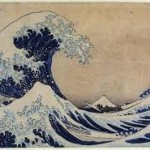The following quotes come from Back to Beginnings, Reflections on the Tao by Huanchu Daoren, translated by Thomas Cleary. They were written around 1600 by a retired Chinese Scholar, Hong Yingming, whose Taoist name, Huanchu Daoren, means “A Wayfarer Back to Beginnings.” In it can be seen a form of lay Taoism dating many centuries further back into history, in which the historical and sociological insights of pristine Confucianism are combined with the advanced educational and psychological know ledges and methodologies of Buddhism and Taoism. Nothing is really known of Huanchu Daoren, except that he wrote these meditations on the Tao which were originally entitled, “Vegetable Root Talks.” He identifies himself as a Confucian, which means that he is a layman; his Taoist epithet, “Back to Beginnings,” says in calendrical symbolism that he has passed the age of sixty, has retired from public affairs, and has started a new cycle of life.
A tangent on “sacred texts” : I found more of use to me in this book of Taoist quotes than in the Tao Te Ching. They have a sparkling sanity and at times seem almost funny in their humble and common sense veracity. I don’t like the way the Tao Te Ching is presented as a sacred text. That’s because I don’t like it when any text is presented as a sacred text. If someone hands you a “sacred text,” treat it roughly. The truth can take it. Take a pen and scribble disagreeable notes next to passages that don’t jive with your inner truth sense. Take a highlighter to any passages that do ring true, then copy them over in your handwriting in your own journal or notebook. No, I don’t regard the I Ching as sacred text either. Using the I Ching can be a sacred process, but the text can always be amplified, improved, reedited—that’s why I use multiple versions.
Much of the violence, gross and subtle, throughout our descent into history has been at the hands of persons possessed of and by a sacred text. And that text could be secular too, it could be the Communist manifesto or the DSM III. Once a text is considered superior to the felt experience of individual truth sense it ceases to be a text and becomes an iron lid on human consciousness.
Huanchu Daoren certainly did not want his writings treated as sacred, and some of his aphorisms and passages worked better for me than others. I think the highlighter more sacred than the text. What lights up in your perception as significant or meaningful is what counts. As Emerson says (I’m paraphrasing, check his essay, The American Scholar, for an exact quote) Why should young men sit in libraries reading Cicero with awe, when Cicero was just a young man in a library when he wrote what they are reading? I like what Huanchu has to say because he made me reach for my highlighter often. —Jonathan
When you are but slightly involved in the world, the effect the world has on you is also slight. When you are deeply enmeshed in affairs, you machinations also deepen. So for enlightened people simplicity is better than refinement, and freedom is better than punctiliousness.
People are considered pure of heart when they do not approach power and pomp; but those who can be near without being affected are the purest of all. People are considered high-minded when they do not know how to plot and contrive; but those who know how yet do not do so are the highest of all.
When you are constantly hearing offensive words and always have some irritating matter in mind, only then do you have a whetstone for character development. If you hear only what pleases you, and deal only with what thrills you, then you are burying your life in deadly poison.
Late at night, when everyone is quiet, sit alone and gaze into the mind; then you notice illusion ending and reality appearing. You gain a great sense of potential in this every time. Once you have noticed reality appearing yet find that illusion is hard to escape, you also find yourself greatly humbled.
Blessings often give rise to injury, so be careful when things are going your way. Success may be achieved after failure, so don’t just give up when you’ve been disappointed.
Those who live simply are often pure, while those who live luxuriously may be slavish and servile. It seems that the will is clarified by plainness, while conduct is ruined by indulgence.
There is a true Buddha in family life; there is a real Tao in everyday activities. If people can be sincere and harmonious, promoting communication with a cheerful demeanor and friendly words, that is much better than formal meditation practice.
Don’t be too severe in criticizing people’s faults; consider how much they can bear. Don’t be too lofty in enjoining virtue, so people may be able to follow.
A grub in filth is dirty, but it changes into a cicada and sips dew in the autumn breeze. Rotting plants have no luster, but they turn into foxfire and glow in the summer moonlight. So we know that purity emerges from impurity, and light is born from darkness.
Conceit and arrogance are acquired states of mind. Conquer acquired states of mind, and basic sanity can unfold. Passion and willfulness are part of false consciousness; erase false consciousness, and true consciousness will appear.
Think about food on a full stomach and you find you don’t care about taste. Think of lust after making love, and you find you don’t care about sex. Therefore, if people always reflect on the regret they will feel afterward to forestall folly at the moment, they will be stable and will not err in action.
Those who have come to an impasse should examine their original intentions; those who have succeeded should note where they are heading.
When the rich and well-established, who should be generous, are instead spiteful and cruel, they make their behavior wretched and base in spite of their wealth and position. When the intellectually brilliant, who should be reserved, instead show off, they are ignorant and foolish in their weakness in spite of their brilliance.
After one has been in a lowly position, one knows how dangerous it is to climb to a high place, Once one has been in the dark, one knows how revealing it is to go into the light. Having maintained quietude, one knows how tiring compulsive activity is. Having nurtured silence, one knows how disturbing much talk is.
To conquer demons, first conquer your mind. When the mind is subdued, demons withdraw obediently. To control knaves, first control your own mood. When your mood is balanced, scoundrels cannot get at you.
In matters of desire, don’t get hastily involved because of easy availability; once you get involved, you will sink in deeply. In matters of principle, don’t back off for fear of difficulty; once you back down, you will lose your ground entirely.
When people are determined, they can overcome fate; when the will is unified, it can mobilize energy. Enlightened people do not even let nature put them in a set mold.
When the liver is diseased, the eyesight fails; when the kidneys are diseased, the hearing is adversely affected. The disease is not visible, but its effects are. Therefore, enlightened people, wishing to be free from obvious faults, first get rid of hidden faults.
There is no greater fortune than having few concerns, no greater misfortune than having many worries. Only those who have suffered over their concerns know the blessing of having few concerns. Only those who have calmed their minds know the misfortune of having many worries.
In dealing with good people one should be magnanimous; in dealing with bad people one should be strict. In dealing with average people one should combine magnanimity and strictness.
Do not think about whatever service you may have done for others; think about what you may have done to offend them. Don’t forget what others have done for you; forget what others have done to offend you.
When those who give charity do so without any sense of self-satisfaction and without any thought of reward, even a small gift is great. When those who aid others calculate their own sacrifice and demand gratitude and recompense, even a great gift is small.
Your own feelings may be reasonable or unreasonable; how can you expect others to always be reasonable? It is useful to see things in this light and thereby correct the contradictions in your expectations for yourself and others.
Those in public office who do not love the people are thieves stealing salaries. Those who teach but do not themselves practice what they teach are mere talkers. Those who try to do successful work without considering development of character will find it insubstantial.
In the mind engaged in struggling with hardship, one always finds something delightful. The sorrow of disappointment arises in the complacency of satisfaction.
The learned should be vigorous and diligent, but they should also be free-spirited. If they are too rigorous and austere, they have the death-dealing quality of autumn but lack the life-giving quality of spring. How can they develop people then?
If the mind is illumined, there is clear blue sky in a dark room. If the thoughts are muddled, there are malevolent ghosts in broad daylight.
People know that fame and position are pleasant, but they do not know that the pleasure of anonymity is most real. People know that hunger and cold are distressing, but they do not know that the distress of not experiencing cold or hunger is greater.
If you fear that people will know if you do something bad, then there is something good in bad. If you are eager for people to know when you do something good, then there is something bad in good.
The workings of heaven are unfathomable—sometimes encouraging, sometimes suppressing. All this makes sport of heroes and tumbles the great. Enlightened people take adversity in stride and are prepared for trouble even when at ease; therefore, they are not at the mercy of fate.
One should not seek happiness, just nurture the spirit of joy as the basis of summoning happiness. One should not try to escape misfortune, just get rid of viciousness as a means of avoiding misfortune.
The road of truth is broad; set the mind on it, and you feel expansive openness and broad clarity. The road of human desires is narrow; set foot on it, and you see brambles and mire before you.
Soil with a lot of manure in it produces abundant crops; water that is too clear has no fish. Therefore, enlightened people should maintain the capacity to accept impurities and should not be solitary perfectionists.
Even a wild horse can be tamed; even metal that is difficult to work eventually goes into a mold. If you take it easy and do not stir yourself, you will never make any progress. It has been said, “It is no disgrace to have many afflictions: I would worry if there never were any afflictions.”
…people of old deemed freedom from greed precious, and this is how they got beyond the world.
The eyes and ears, seeing and hearing, are external plunderers; emotions, desires, and opinions are internal plunderers. But if the inner mind is awake and alert, sitting aloof in the middle of it all, then these plunderers change and become members of the household.
Even if you do no work that is particularly lofty or far-reaching, if you can shed mundane feelings, that is a great achievement. Even if you do not strive much for progress in learning, if you can minimize the influence things have on you, you will soar into the realm of sages.
In whatever you do, if you leave a sense of incompleteness, then Creation cannot resent you, ghosts and spirits cannot harm you. If you insist on fulfillment in your work and perfection in achievement, you will become either inwardly deranged or outwardly unsettled.
If a poor house is well kept, or a poor girl well groomed, there is elegance if not beauty. If good people should come upon hard times, why should they immediately give up on themselves?
If you are not lax when at leisure, you will be effective when busy. If you are not absentminded in tranquility, that will be useful in action. If you are not hypocritical in private, that will show up in public.
When thoughts arise, as soon as you sense them heading on the road of desire, bring them right back onto the road of reason. Once they arise, notice them, once you notice them, you can change them. This is the key to turning calamity into fortune, rising from death and returning to life. ( For a modern view on how to do this see Tara Bennet Goleman’s book: Emotional Alchemy —Jonathan)
In adversity, everything that surrounds you is a kind of medicine that helps you refine your conduct, yet you are unaware of it. In pleasant situations, you are faced with weapons that will tear you apart, yet you do not realize it.
Delicious foods are drugs that will inflame the gut and rot the bones, but there is no harm if one eats moderately. Delightful things are all purveyors of destruction and decadence, but there is no regret if one enjoys them moderately.
Valuing unusual conduct is not as good as being careful about ordinary actions.
Compromise to please others is not as good as integrity that annoys others. Rather than be praised without being good, it is better to be slandered without being bad.
When one is not slipshod in small matters, not hypocritical in secret, and not reckless in disappointment, only then is one a true hero.
A thousand pieces of gold may hardly bring a moment’s happiness, but a small favor can cause a lifetime’s gratitude. Too much love can turn to enmity, while aloofness can produce joy.
People’s shortcomings should be treated with tact; if you expose them crudely, this is attacking weakness with a weakness. When people are stubborn, it requires skill to influence them; if you treat them with anger and spite, this is treating stubbornness with stubbornness.
When you meet silent and inscrutable people, don’t tell them what you are thinking. When you meet irritable and self-serving people, be careful what you say.
A clear sunny day can suddenly shift to thunder and lightning, a raging storm can suddenly give way to a bright moonlit night. The weather may be inconstant, but the sky remains the same. The substance of the human mind should also be like this.
Perception is a clear jewel that shows up demons; strength is a sword of wisdom that cuts down demons. Both are necessary.
To notice people’s deceptions yet not reveal it in words, to bear people’s insults without showing any change of attitude—there is endless meaning in this, and also endless function.
Unexpected hardship refines people; if you can accept it, both mind and body will benefit. If you cannot accept it, on the other hand, both mind and body will be harmed.
Our body is a small universe; to regulate emotions and feelings is a way of harmonization.
If those who give are conscious of their own generosity and those who receive feel indebted, they are no longer family but rather strangers doing business.
Public behavior is nurtured in private; earthshaking measures come form careful steps.
Virtue is the master of talent, talent is the servant of virtue. Talent without virtue is like a house where there is no master and their servant manages its affairs. How can there be no mischief?
To get rid of villains and knaves, it is necessary to give them a way out. If you don’t give them any leeway at all, they will be like trapped rats. If every way out is closed to them, they will chew up everything good.
When enlightened people are so poor that they cannot help others, if they speak a word to awaken the confused or to resolve a problem, there is also boundless merit in that.
For those who reflect on themselves, everything they encounter is medicine. For those who attack others, every thought is a weapon. One is the way to initiate all good, one is the way to deepen all evil. They are as far apart as sky and earth.
Business and scholarship pass away with the person, but the soul is forever like new. Fame and fortune change with the generations, but the spirit is always the same. Enlightened people surely should not exchange the lasting for the ephemeral.
A net set up to catch fish may snare a duck; a mantis hunting an insect may itself be set upon by a sparrow. Machinations are hidden within machinations; changes arise beyond changes. So how can wit and cleverness be relied upon?
When water isn’t rippled, it is naturally still. When a mirror isn’t clouded, it is clear of itself. So the mind is not to be cleared; get rid of what muddles it, and its clarity will spontaneously appear. Pleasure need not be sought; get rid of what pains you, and pleasure is naturally there.
One of our predecessors said, “Throwing away the inexhaustible treasury of your own home, you go with your bowl from door to door, acting like a beggar”`
Those who trust others will find that not everyone is necessarily sincere, but they will be sincere themselves. Those who suspect others will find that not everyone is necessarily deceiving them, but they have already become deceivers themselves.
Those who are broad-minded and considerate are like the spring breeze, warm and nurturing, at show touch all being grow. Those who are envious an d cruel are like the snow of the northlands, stilling and freezing, at whose touch all beings die.
Diligence means to be keen in matters of virtue and justice, but worldly people use diligence to solve their economic difficulties. Frugality means to have little desire for material goods, but worldly people use frugality as a cover for stinginess. Thus do watchwords of enlightened life turn into tools for the private business of small people. What a pity!
Those who act on excitement act intermittently; this is hardly the way to avoid regression. Those whose understanding comes from emotional perceptions are as confused as they are enlightened; this is not a lamp that is constantly bright.
You should be forgiving when others make mistakes, but not when the mistakes are in you. You should be patient under duress yourself, but not when it affects others.
Generosity should begin lightly and deepen later, fro when it is first rich and then lessens, people forget the kindness. Authority should begin strictly and loosen up later, for if it is loose first and then strict, people will resent the severity.
If you do not join the polluted, then you are pure; if you reject society in search of purity, that is not purity but fanaticism.
The substance of mind is the substance of heaven. A joyful thought is an auspicious star or a felicitous cloud. An angry thought is a thunderstorm or a violent rain. A kind thought is a gentle breeze or a sweet dew. A stern thought is a fierce sun or an autumn frost. Which of these can be eliminated? Just let them pass away as they arise, open and unresisting, and your mind merges with the spacious sky.
When you meet dishonest people, move them with sincerity. When you meet violent people, affect them with gentility. When you meet warped people, inspire them with justice. Then the whole world enters your forge.
A moment of kindness can produce a mood of harmony between heaven and earth. Purity of heart can leave a fine example for a hundred generations.
There is much meaning in the word endure. For example, when dealing with unstable human feelings and uneven pathways in life, without endurance to hold you up, you may fall into a pit in the brush.
You should not be too much of a purist in your way of life, for you need to be able to accept all that is foul. You should not be too clear in making distinctions in social interactions, for you need to accept everyone whether they are good or bad, wise or foolish.
The sickness of indulging desires can be treated, but the sickness of clinging to abstract principles is hard to treat. Obstacles presented by events and objects can be removed, but obstacles presented by social principles are hard to remove.
Polish what you polish until it is like gold that has been refined a hundred times; anything that is done in a hurry is not deeply developed. Do what you do like a thousand-pound catapult; one who pops off too easily does not accomplish much.
At dusk the sunset is beautifully bright; at year’s end the tangerines are even more fragrant. Therefore, at the end of their road, in their later years, enlightened people should be a hundred times more vital in spirit.
Observe people with cool eyes, listen to their words with cool ears. Confront feelings with cool emotions, reflect on principles with a cool mind.
Attention is the mind’s feet; if you do not control your attention strictly, it runs into misleading pathways.
Sexual desire may burn like fire, but when you give a thought to when you are ill, then your excitement dies down. Fame and fortune may be sweet as candy, but when you give a thought to when you die, then their flavor is like chewing wax. Therefore, if people are usually concerned about death and illness, this can also dissolve unreal activities and develop longing for the way.
Even if you can’t get rid of the heat, as long as you can get rid of bother with the heat, your body is always on a cool terrace. Even if you can’t get rid of poverty, as long as you can get rid of the sadness of poverty, your mind always lives in a comfortable abode.
When greedy people are given gold, they are bitter that they haven’t gotten jewels; when they are made barons they are resentful that they haven’t been made lords. Though powerful and rich, their attitude is that of beggars. For those who know how to be content, simple fare is more delicious than rich delicacies, a cloth coat is warmer than fox fur, and an ordinary citizen does not defer to a king or a lord.
If you know that whatever is made inevitable breaks down, you needn’t seek too hard for achievement. If you know that all living beings inevitably die, you needn’t work too hard on health lore.
The powerful and prominent soar like dragons, the heroic and valiant fight like tigers: but if you look upon them with cool eyes, they are like ants gathering on rancid meet, like flies swarming on blood. Judgments of right and wrong bristle like porcupine quills: but if you meet them with cool feelings, that is like a forge melting metal, like hot water dissolving snow.
Those who turn things around by themselves do not rejoice at gain or grieve over loss; the whole world is the range they roam. Those who are themselves used by things hate it when events go against them and love it when they go their way; the slightest thing can create binding entanglements.
Those who like tranquility and dislike clamor tend to avoid people to seek quietude. They do not know that when one wishes there were no one around, that is egotism; and when the mind is attached to quietude, that is the root of disturbance. How can they reach the state where others and oneself are seen as one, where disturbance and quietude are both forgotten.
The realms of good fortune and calamity in human life are all made of thoughts and imaginings. Therefore Buddhists say that the burning of desire for gain is itself a pit of fire, while drowning in greedy love is itself a bitter sea. The moment thoughts are pure, fierce flames become a pond; the moment you become aware, the boat has arrived on the further shore. If your thoughts vary at all, your world will immediately differ, so can we not be careful?
Flowers should be viewed when half open, wine should be drunk only to subtle intoxication; there is great fun in this. If you view flowers in full bloom and drink to drunkenness, it becomes a bad experience. Those who are living to the full should think about this.

 ZapOracle.com home to the free 720-card Zap Oracle
ZapOracle.com home to the free 720-card Zap Oracle







i really love the qoutes.it is so interesting.
THIS IS A LIE NOTHING BUT A CuLT
only in soviet russia
Beautiful website and interpretion of Taoist quotes. I really love this work!
Very interesting and helpful!